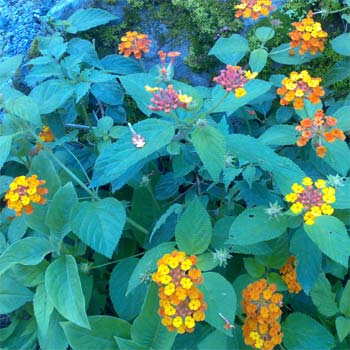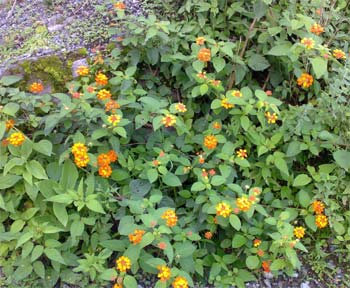The middle Himalayan ranges unto 2000 Mts. are temperate zones
growing a number of typical temperate climate plants.
The sub alpine unto 2500 Mts. grow high altitude plants
an have the capacity to rear plants of alpine zones as well.
Alpine zone is referred to the land between snow line and above
2000 Mts. This is a typical high Himalayan belt.
District Nainital contains all the zone except the alpine one.
The soil structure and texture also varies from high sandy soils
having 70 to 80% sand to clay soils in which the clay percentage
is unto 20%.
In between vast tracts possess sandy lome soils which are neither
heavy nor very light.
|
|
FLORA
AND FAUNA
The Nainital District hilly region is covered with Sal, Pine, Oak,
Buruns, Kaphal and other trees growing unto 6000 ft. along with Deodar,
Surai etc. at higher altitudes. There are small tracts of cultivated
lands and fruit orchards like Apricot, Oranges, Peach, Pears, Big
lemons, Kafal, Strawberry, Banana and Apple and Litchi orchards that
grow mainly in the Ramgarh and Mukteshwar belt.
Biological Diversity of
Nainital District
Nainital District is unique for its biodiversity and ecological
amplitude. It has more than 1000 species of resident and
migratory birds, 20 species of mammals, over 525 species of butterflies
and over 11,000 species of moths, beetles, bugs and other insects.
The flora covers a wide and diverse range of plants ranging from
Bryophytes, orchids, rare climbing plants, ferns, lichens, fungi,
medicinal herbs and shrubs. Each individual lake has its own unique
Diatom index. The Trophic Diatom Index uses the composition of freshwater
diatom assemblages to assess water quality and ecological status.
Nainital District has Richest Oak, Pine and Rhododendron Forest
main habitats for Excellent Birding
Birds in Nainital District
The unique avian fauna of Nainital District includes red-billed
blue magpie, kingfishers, blue-throated and brown-headed barbets,
lineated barbet, golden-throated barbet, crimson-fronted barbet,
coppersmith Barbet plum-headed parakeet, slaty-headed Parakeet,
chestnut bellied rock thrush, titmouse, babblers, jungle Owlet,
fish eagle, pied woodpecker, brown-capped pygmy woodpecker, grey-capped
pygmy woodpecker, brown-fronted woodpecker, stripe-breasted woodpecker,
yellow-crowned woodpecker, rufous-bellied woodpecker, crimson-breasted
woodpecker, Himalayan woodpecker, lesser yellownape woodpecker,
greater yellow-naped woodpecker, streak-throated woodpecker, grey-headed
woodpecker, scaly-bellied woodpecker, common flameback woodpecker,
Indian tree pies, blue whistling-thrush, lammergeier, Himalayan
Griffon, crested serpent eagle, flycatchers, cheer pheasants, Kalij
pheasant, Koklas pheasants, dollarbird, leaf birds, flowerpecker,
purple sunbird, brown headed stork-billed kingfisher, stork-billed
kingfisher, crested kingfisher, white-throated kingfisher, pied
kingfisher, common kingfisher, blue-eared kingfisher, Himalayan
kingfisher, Mrs. Gould’s sunbird, green-tailed sunbird, black-throated
sunbird, black-breasted sunbird, Crimson sunbird, fire-tailed sunbird,
thick-billed flowerpecker, plain-leaf flowerpecker, fire-breasted
flowerpecker, russet Sparrow, rufous Babbler, black-headed Jay,
scaly-breasted wren-Babbler, black-capped sibia, blue whistling
thrush, finches, mountain hawk eagle, black eagle, eurasian jay,
white-rumped needletail, black-headed jay, black-lored, black-throated
tits, black bulbul, ashy-throated warblers, black-chinned babbler,
rufous-breasted accentor, red-billed blue magpie, grey-winged blackbird,
Eurasian griffon, common buzzard, black-chinned babbler, pink-browed
rosefinch, common wood pigeon, slaty-headed parakeet, laughingthrush,
chestnut-tailed minla, lemon-rumped warblers, and many more.
| Birds
In and Around Nainital District |
|
|
| Birds
Corvus macrohynchoes (Jungle crow) |
Corvus splendens (house crow) |
|
Parus monticolus (green backed tit) |
Trochalopteron lineatrum (Streaked laughing Thrush) |
Turdus boulboul (Grey Winged Black Bird)
|
Passer domesticus (House Sparrow) |
|
Certhia himaayana (The Himalayan Tree Creeper) |
Acridotheres tristis (Common Myna)
|
Pericrocotus brevirostris (short billed minivet)
|
|
Horticulture
Apple orchards are found mainly in Ramgarh (Nainital District) Mukteshwar
(Nainital District) belt.
Beside this Peach, Pears, Apricot, Citrus fruits, Kafal, Strawberry,
Hills Banana grown in the hilly track, Lichi of Ramnagar makes Nainital
a main fruit growing district. Tea plantation work is also in progress
in the slopes of Niglat & Ghorakhal. Now a days a number of floriculture
farm have mushroomed in the district due to its favorable climate
for growing flowers.
In its Tarai & Bhabhar belt a number of medicinal trees, shrubs
and herbs grow like Vijayasar, Arjun, Bhilwa, Varun, Gambhari, Kutuj,
Tejpatra, Priyangoo, Danti, Sarivah, Shwet Sarivah, Brahmi, Satwahi,
Patha, Bhringraj, Punarnava, Kamal & Kamalni, Gokhru, Anatmool,
Marodfali, Talwarfali, Ashok, Kaliyali, Pipli, various species of
Mentha and so on. There is potential to grow Mulhatti, Aswagandha,
Saptaparna and so many other plants of various zones of India.
 |
 |
These plants can also grow in the deep valleys of hills. In the
middle Himalayan range we find Daruharidra, Timoor, Manjishtha,
Sugandhabala, Samayava, Manduparna, Dhooplakkar, Talish, Devdaru,
Padam, Vidhangabhed, Kakoli, Ksheerkakoli, Lahsuniya and so many
other plants. This range has the potential to grow plants like Saffron,
Vindhanga, Ghritkumari and so on.
The sub alpine zone of this district grows Fern, Deodar , various
other species of Daruharidra, Sugandhabala, Banapsa. It has the
potential to grow plants like Gandhanarain, Kutki, Kooth, Bhootkesi,
Junipers, Abies which is called Fern. Here around 2500 mts. plants
like Jatamasi, Mithavish, Atish can also be tried.
 |
Many of these plants have a great commercial importance. These are
widely used in indigenous system of medicines like Ayurveda, Yunani,
Aamchi (Tibetan System) for skin diseases, stomach disorder, nervous
disability, liver diseases. Many of these are used in heart & brain
tonics. Some are blood purifiers and strengthen the immunity mechanism.
At present crores of this herbal raw material is supplied to Haldwani,
Ramnagar, Dehradun & other mandis of plains. Bheshaj Sanghs & K.M.V.N.
has the official authority to collect these medicines.
Animals
Presbytis schistaceous (Himalayan Langoor), Invus rhesus (Monkey),
Urssus Tibetans (Rich), Martes flavigula (Black capped Marten),
Hysrix leucura (Indian Porcupine), Sus Indicus (Wild pig), Cervulus
aurens (Barking deer), Pteromys petaurista (Brown flying squirrel),
Nemorhoedus goral (Gural).
|

